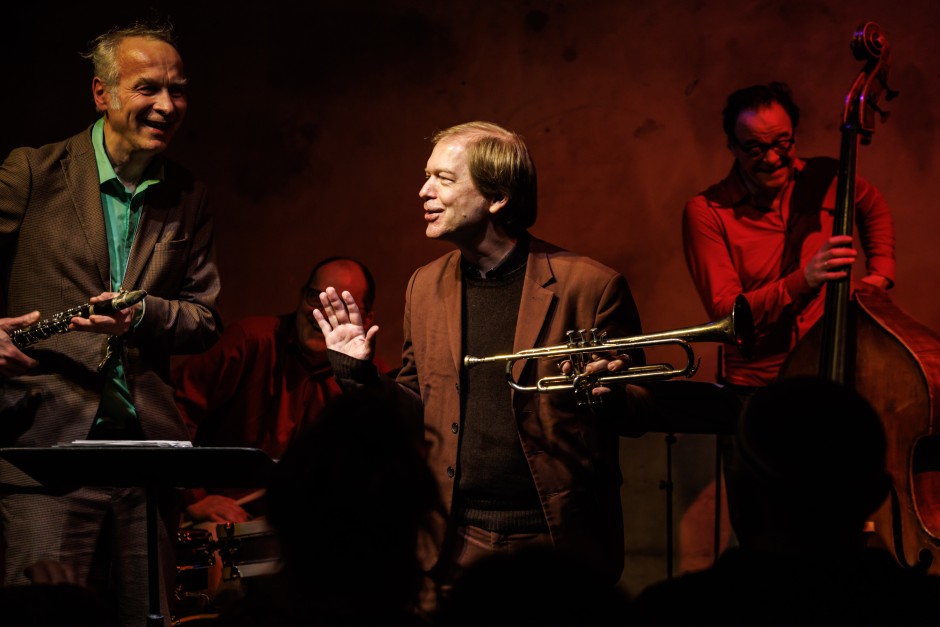
In “ausland”, a club in the basement of an old building in Prenzlauer Berg, the new year started with a disappointment. Not with any, of course, but with “The Complete Disappointment”. Founded almost thirty years ago, the quartet around the trumpeter Axel Dörner and the clarinetist Rudi Mahall presented a major retrospective: Die Ententäustung has recorded six albums, and on this first evening in January the four musicians brought the Pieces from albums three and four on stage.
Disappointment, according to Axel Dörner before the start of the concert, can also mean something positive, especially at the beginning of the year, namely the disappearance of illusions, the clarification of the view. Otherwise the trumpeter says little, because Rudi Mahall is responsible for all announcements and non-announcements – the titles of the pieces were revealed only reluctantly or were renamed on the spot. As a born emcee, he even puts on a cheerful piece guessing for the audience: some of Dörner’s compositions are based on chord progressions from classical jazz standards, and whoever guesses which standard was behind the first of these pieces can win a night with the trumpeter (in which he will play the winner’s records innocently). But of course no one comes across “How High the Moon”, because after all there is no actual harmony instrument on the “Ententuschung” that one could concentrate on when listening and guessing.
Between tradition and free jazz
The quartet line-up without piano goes back to Ornette Coleman’s quartet, but even if what Die Ententeuentungs plays could be subsumed under free jazz, the band doesn’t sound like “A Shape of Jazz to Come” at all. She is closer to the bebop of Charlie Parker and Dizzy Gillespie, especially since Die Entteuentungs together with the pianist Alexander von Schlippenbach presented the first complete recording of Thelonious Monk’s works in 2005. But the sound of Louis Armstrong and Benny Goodman, the marching band and swing orchestra, flashes again and again, because the music of the four Berliners comes entirely from their legs.
But there is a very special, European swing that is in this music, maybe even a specifically Berlin one. It is the gait of those who walk along Schönhauser Allee and Hermannstrasse, it is the rattling of the Berlin subway, the screeching of the tram in the curves that one hears in the band’s pieces. With Michael Griener on drums and Jan Roder on bass, Mahall and Dörner (both awarded the prestigious SWR Jazz Prize) play thoroughly urban music, in which the fast-paced dialogues, flirting and smirking of those who happen to be on meet the street, sentences that are called from the moving car, the ringing of excited bicycle bells (Griener), the honking of the taxis (Dörner), the thumping of the boxes in Görlitzer Park (Roder). Whether it rattles or crackles, squeaks or whimpers: the music is always noisy, but even in moments that have something cacophonic about them, your feet don’t stop twitching, you still think you can feel the pavement under your soles.
A song called “rail replacement traffic”
It is no coincidence that one of the many pieces, which are barely two minutes long, is called “rail replacement traffic”. A quick cigarette, then we’re on our way. Here, between the bare concrete walls of “abroad”, there is no euphony. But it never goes completely in the other direction either, because the pure noise is just as foreign to the four as the beautiful sound. It’s not music of extremes, not existentialism, not a political statement, but rather a kind of musical street photography, often funny and always witty. Many of the tricky themes resemble riddles – which are not solved in the improvisation, but hurled at the wall with relish.
The Disappointment has nothing to do with the sharpness and the pointed elbows of New York. Their music is quite rough, but at its core friendly, light and bright. Trumpet and clarinet react to each other just as quick-wittedly as the musicians respond to questions from the audience: When someone asks what key the next piece is in, Dörner and Mahall laugh and say: In the chromatic key. It may be weird what this band plays, but nothing is weird here. In a cheerful zigzag you then circle the bumps in the cobblestones of Lychener Straße and look a little more confident into the new year.
















